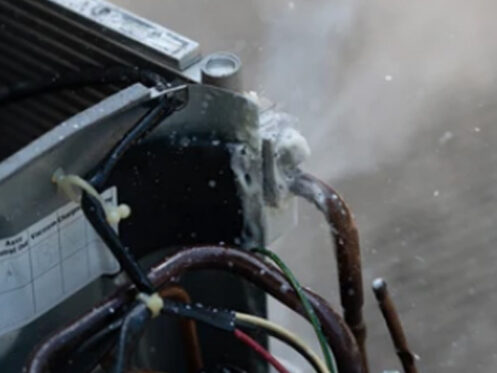When your air conditioner is running, do you hear a hissing or bubbling noise? Or maybe you’ve noticed that your home’s temperature is a slightly “off” and falls short of the requirements established by your thermostat? If this is the case, you may have a refrigerant leak.
This may occur sometimes in air conditioners, but it often leads in decreased efficiency, effectiveness, and eventually the failure of the device. If you believe that this kind of situation will resolve itself, you are absolutely mistaken!
While you do not need to be an expert on refrigerant, it is critical to grasp how critical it is and why a leak is a terrible thing. Continue reading to learn more!
Complete Guide to Refrigerant Leaks
It is important to know and understand the why’s and how’s of refrigerant leaks as this could give you and idea in determining whether to call a professional for air conditioning repair or maintenance in Florida.
Leaks of refrigerant may occur in almost every kind of air conditioner. Time and constant usage will wear down your air conditioning system, and in certain cases, this may result in the wear and tear of the refrigerant line, resulting in the formation of a leak.
Refrigerant Is Not a Fuel
Many homeowners believe that the refrigerant in their air conditioners is a kind of fuel but that is just a common misconception we’d want to clarify. Your air conditioning system operates without “consumption” of refrigerant. It is powered by electricity, either from the grid or from the sun if solar panels are used.
At the time of manufacture, your air conditioner is given with enough refrigerant—or rather, charged with enough refrigerant—to survive its entire lifespan unless there is a leak. The refrigerant in your air conditioning system performs a heat exchange process. This refrigerant alternates between liquid and gaseous phases in order to collect and then release heat from inside the house. During this procedure, it does not evaporate.
Dangers of a Leak
Refrigerant is critical to the performance of your air conditioner. When a leak occurs in your system, you’ll see the following issues worsen the longer the leak is neglected.
- Reduced Cooling Capacity: With less refrigerant, your system’s cooling capacity will be reduced.
- Increased Energy Consumption: A refrigerant leak forces your air conditioner to work harder to cool the house, resulting in an increase in energy consumption.
- Icy Evaporator Coil: It may sound contradictory, but an icy evaporator coil is real. Leaks of refrigerant might result in the formation of ice on your evaporator coil.
- Early Replacement: If a leak is left unchecked long enough, it might result in a complete system collapse, requiring a costly replacement years early than necessary.
How to Identify a Refrigerant Leak?
Sadly, your air conditioner will not inform you when it has a refrigerant leak. At times, it will be clear, and for some times, it will be a little more difficult to identify. If you have a refrigerant leak, you should repair it immediately.
Here are some signs that you should request assistance with a repair.
1. Low Cooling Output
A system with insufficient refrigerant will have a difficult time cooling your house than one with the proper amount of refrigerant. Therefore, if you notice that your air conditioner never reaches the degrees listed on your thermostat, regardless of how long it runs or how mild the temperature settings are, you may have a refrigerant leak.
As refrigerant escapes from the system, the air conditioner must operate at the same cooling capacity using less refrigerant.
2. High Energy Bills
Due to the fact that the leak impairs your air conditioner’s cooling capacity, it increases energy needs, which results in a rise in your utility costs. As your air conditioning system has to work harder from decreasing refrigerant levels, you’re going to incur a higher energy bill. This results in increased energy costs, which are often excessive. If your energy costs have been steadily increasing and you know it’s because of your air conditioner, it may be time to fix the refrigerant leak.
3. Ice on the AC
When a cooling system contains less refrigerant, unexpected abnormalities in the process might occur. Occasionally, refrigerant may be cooled to an abnormally low temperature. This results in the freezing of moisture that has accumulated on the coils. That is why you may sometimes see ice developing on an air conditioner!
Eventually, it is a big factor. Not only should the refrigerant leak be repaired, but your system should also be inspected by an expert to verify that nothing else is contributing to the issue.
4. Noisy AC System
When your system is running, a refrigerant leak might produce hissing or bubbling sounds. Both bubbling and hissing are symptoms of a refrigerant leak in your air conditioner. If you hear this sort of noise, contact a professional to have the leak fixed and the refrigerant in your air conditioner replenished.
5. AC Going On and Off
If your system goes on for a few minutes and then shuts off, only to turn back on again, this might be the result of a refrigerant leak.
As your refrigerant leaks can be problematic and expensive, do not overlook a leak within your air conditioning system! Rather than that, contact a professional near you to have the issue assessed and treated before it results in the need for a replacement rather than a repair.
Contact Cape Coral, FL’s Most Trusted HVAC Service Provider
When it comes to AC repair in the entire Charlotte county, Lee County, and Collier county area of the Southwest Florida, contact Non-Stop Air Conditioning & Heating. We understand how to deal with refrigerant leaks, how to fix them, and how to properly recharge your system. Our whole-home air conditioning, heating, and air purification services, which specialize in residential AC repairs, installations, and maintenance are guaranteed masterful and budget-friendly. We are equipped to deal with any HVAC issues 24 hours, 7 days a week.


